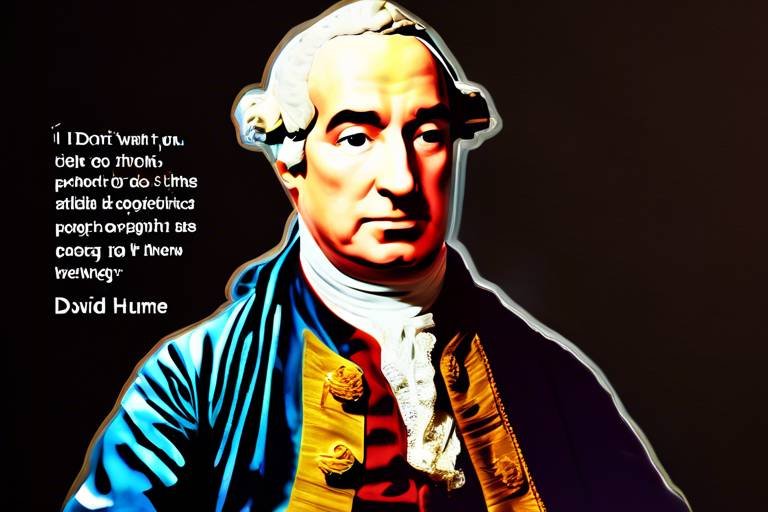Wittgenstein's Thought on the Philosophy of Language
When we dive into the realm of philosophy, we often encounter the profound ideas of Ludwig Wittgenstein, a thinker who reshaped our understanding of language and its intricate dance with meaning. Wittgenstein's insights are not just academic musings; they resonate with our daily interactions and the very fabric of communication. Have you ever paused to think about how we use words to convey thoughts, emotions, and ideas? Wittgenstein invites us to explore these questions in depth, challenging us to reconsider what we really mean when we speak.
One of the most striking features of Wittgenstein's philosophy is his belief that language is not a mere tool for communication but a complex system intertwined with our actions, contexts, and social practices. He famously suggested that the meaning of a word is not fixed but rather fluid, shaped by how it is used in various contexts. This perspective shifts our understanding from viewing language as a static collection of definitions to seeing it as a dynamic, evolving entity. Imagine language as a living organism, adapting and changing based on the environment it inhabits. This analogy captures Wittgenstein's view perfectly.
Wittgenstein's early work introduced the Picture Theory of Language, where he proposed that language functions as a representation of reality. According to this theory, words correspond to objects and states of affairs in the world, much like a picture depicts what it represents. However, as he delved deeper into the intricacies of language, he realized that this model was too simplistic. He began to emphasize the importance of context and social interaction, leading to his later concept of language games.
In essence, language games illustrate how meaning is derived from the specific contexts in which language is used. Just as players in a game follow rules that dictate their actions, speakers of a language adhere to the implicit rules that guide their communication. This notion challenges the idea of fixed definitions and highlights the importance of understanding language within the social practices that give it life. So, when we communicate, we’re not just exchanging words; we’re engaging in a complex interplay of meanings shaped by our shared experiences and communal activities.
Moreover, Wittgenstein's critique of private language further emphasizes that language is inherently public. He argued that meaning arises from shared experiences, suggesting that isolated, subjective expressions cannot convey genuine meaning. This perspective invites us to appreciate the communal nature of language, reminding us that our words are rooted in the social fabric of our lives.
As we navigate through Wittgenstein's thoughts, we encounter a rich tapestry of ideas that challenge traditional notions of meaning. He proposed that meaning is not a static property but a dynamic aspect shaped by use, context, and the interplay of language and life. This fluidity of meaning is essential for understanding how we communicate effectively. For instance, consider the word "bank". In one context, it might refer to a financial institution, while in another, it could mean the side of a river. The meaning shifts depending on how and where it is used, highlighting the importance of context in our understanding.
Wittgenstein also acknowledged the limitations of language, famously stating that "whereof one cannot speak, thereof one must be silent." This assertion underscores the boundaries of linguistic expression, reminding us that there are experiences and thoughts that elude verbal articulation. It’s a humbling realization that sometimes, silence speaks louder than words, and understanding transcends mere verbal communication.
In conclusion, Wittgenstein's contributions to the philosophy of language invite us to rethink our approach to communication. His ideas challenge us to consider the fluidity of meaning, the significance of context, and the communal nature of language. As we engage with his thoughts, we are encouraged to explore not only how we use language but also how it shapes our understanding of the world around us. So, the next time you engage in conversation, remember that every word carries a weight of meaning shaped by the intricate tapestry of human experience.
- What is the Picture Theory of Language?
The Picture Theory suggests that language functions as a representation of reality, where words correspond to objects and states of affairs in the world. - What are language games?
Language games emphasize that meaning is derived from the context and use of language within specific social practices and interactions. - Why is private language criticized?
Wittgenstein argues that language is inherently public, as meaning arises from shared experiences and cannot be accurately conveyed through isolated, subjective expressions. - How does context influence meaning?
Context plays a crucial role in shaping the meaning of words, as their significance can change based on the situation in which they are used.

The Picture Theory of Language
This article explores Ludwig Wittgenstein's influential ideas on language, meaning, and understanding, highlighting his contributions to the philosophy of language and its implications for communication and interpretation.
Wittgenstein's early work introduced the Picture Theory of Language, a revolutionary concept that fundamentally changed how we perceive the relationship between language and reality. At its core, this theory suggests that language serves as a representation of the world, where words are not just arbitrary symbols but are instead direct correspondences to objects and states of affairs in our surroundings. Imagine language as a map; just as a map represents geographical features, words and sentences depict the elements of reality.
According to Wittgenstein, when we use language, we are essentially creating pictures in our minds that correspond to the world around us. This idea challenges the traditional view of language as merely a tool for communication. Instead, it posits that the essence of language lies in its ability to depict and mirror reality. For instance, when you say the word "cat," you are not just uttering a sound; you are invoking a mental image that corresponds to a real-world feline. This connection between language and the world is crucial for understanding how meaning is constructed.
However, Wittgenstein also recognized that this theory has its limitations. The Picture Theory assumes a one-to-one relationship between words and the world, which can be overly simplistic. Language is more nuanced and complex than mere representation. For example, consider the word "freedom." This term can evoke a plethora of images and meanings depending on the context in which it is used. Thus, while the Picture Theory offers valuable insights into the nature of language, it also invites us to explore deeper dimensions of meaning.
To illustrate the Picture Theory further, we can consider the following table that outlines its key components:
| Component | Description |
|---|---|
| Words | Represent objects or concepts in reality. |
| Sentences | Combine words to depict states of affairs. |
| Meaning | Derived from the relationship between language and reality. |
| Limitations | Does not account for abstract or contextual meanings. |
In summary, Wittgenstein's Picture Theory of Language urges us to reconsider how we think about words and their meanings. It invites us to see language as a living, breathing entity that interacts with the world, rather than a static set of definitions. This perspective opens the door to a more profound understanding of communication, where the interplay between language and reality creates a rich tapestry of meaning.
- What is the Picture Theory of Language?
The Picture Theory of Language is a concept introduced by Wittgenstein suggesting that language represents reality, where words correspond to objects and states of affairs. - How does Wittgenstein's theory challenge traditional views of language?
Wittgenstein's theory posits that language is not just a tool for communication but a representation of reality, emphasizing the connection between words and the world. - What are the limitations of the Picture Theory?
While it provides valuable insights, the Picture Theory can be overly simplistic as it does not account for abstract meanings or the contextual use of language.

Language Games
Ludwig Wittgenstein's concept of revolutionized our understanding of how language operates in social contexts. Imagine a game of soccer; the rules, the players, and the field all contribute to how the game is played and understood. Similarly, Wittgenstein proposed that language does not have a fixed meaning but is instead shaped by its use in various contexts. He believed that meaning is not something that exists in isolation, but rather emerges through interaction and practice within specific social settings. This perspective invites us to see language as a dynamic tool, one that adapts and evolves based on the circumstances in which it is employed.
To illustrate this further, consider how the word "bank" can mean different things depending on the context. In a financial conversation, it refers to a financial institution, while in a fishing context, it might refer to the side of a river. This flexibility in meaning underscores Wittgenstein's point: words are like actors in a play, taking on different roles depending on the scene. The meaning of a word is thus intricately tied to the rules of the language game being played, which can change based on who is speaking, where they are, and what they are discussing.
Wittgenstein emphasized that there are countless language games, each with its own set of rules and contexts. For instance, the language used in a scientific discussion differs significantly from that in a casual conversation among friends. Each context demands a different understanding of how language operates. Here’s a simple table illustrating different contexts and their associated language games:
| Context | Language Game | Example |
|---|---|---|
| Scientific Discourse | Formal Analysis | Discussing theories and experiments |
| Everyday Conversation | Casual Exchange | Talking about weekend plans |
| Legal Settings | Legal Argumentation | Arguing a case in court |
| Art Critique | Interpretative Discussion | Analyzing a painting's meaning |
This idea of language games also leads us to consider the importance of context in communication. When we engage in a conversation, we are not merely exchanging words; we are participating in a complex interplay of meanings shaped by our shared experiences and the specific situation at hand. Wittgenstein's approach encourages us to think critically about how we communicate and to be aware of the nuances that come into play. It’s like being a musician in an orchestra; understanding your part within the larger composition is essential for harmony.
Moreover, Wittgenstein's notion of language games challenges us to rethink traditional views of meaning. Instead of seeing meaning as a static definition, he invites us to view it as a living, breathing aspect of human interaction. This perspective is particularly relevant in our increasingly globalized world, where cross-cultural communication often requires us to navigate different language games. We must be mindful of the rules and contexts that govern these interactions to foster genuine understanding and connection.
In conclusion, Wittgenstein's concept of language games provides a profound lens through which to examine the fluid nature of language. It reminds us that communication is not just about words but about the rich tapestry of social practices and contexts that shape our understanding. So, the next time you engage in a conversation, think about the game you're playing and how the rules might shift based on the context. This awareness can open up new avenues for understanding and connection in our everyday interactions.
- What are language games? Language games refer to the various contexts and practices in which language is used, emphasizing that meaning is derived from its practical application rather than fixed definitions.
- How do language games affect communication? They influence how we understand and interpret words based on the rules and contexts of the conversation, making communication a dynamic process.
- Can you give an example of a language game? Yes! A simple example is the difference in meaning of the word "bark" in a conversation about trees versus a discussion about dogs.

Rules and Context
Wittgenstein's exploration of language takes a fascinating turn when he introduces the idea that meaning is not fixed but fluid. He challenges the traditional notion that words have a single, immutable definition. Instead, he posits that the meaning of a word is shaped by the rules governing its use in specific contexts. Imagine a game of soccer; the rules dictate how players interact with the ball and each other, and these rules are what give the game its meaning. Similarly, language operates within a set of 'rules' that are determined by the social context in which it is used.
This perspective leads to a significant shift in how we understand communication. When we speak, we are not merely stringing together words based on their dictionary definitions; rather, we are engaging in a complex interplay of social practices and shared experiences. For instance, consider the word "bank." In one context, it might refer to a financial institution, while in another, it could mean the side of a river. The meaning is not inherent in the word itself but is derived from the context in which it is used. This is what Wittgenstein means when he emphasizes the importance of contextual understanding.
Furthermore, Wittgenstein argues that these rules are not static; they evolve with the language users and their interactions. He famously stated that "the meaning of a word is its use in the language." This means that to truly understand a language, one must not only know the words but also the contextual rules that govern their application. This fluidity is what makes language so rich and dynamic, but it can also lead to misunderstandings when people apply their own interpretations without considering the shared context.
To illustrate this point further, let’s consider a few examples:
- Greeting someone: The phrase "How are you?" can be a genuine inquiry about someone's well-being or just a casual way to say hello, depending on the context.
- Idiomatic expressions: Phrases like "kick the bucket" have meanings that are not directly related to the words themselves but are understood within specific cultural contexts.
- Technical jargon: In a medical context, the word "patient" has a very specific meaning that differs significantly from its everyday use.
In essence, the rules of language are akin to the guidelines of a dance. Each partner must be aware of the steps and movements of the other to create a harmonious performance. If one dancer deviates from the established routine without the other's understanding, chaos ensues. Similarly, communication can break down when individuals fail to recognize the contextual rules that govern their interactions.
Wittgenstein's insights into the rules and context of language not only enrich our understanding of communication but also highlight the necessity of shared experiences and communal activities in the creation of meaning. By embracing this perspective, we can navigate the complexities of language with greater awareness and sensitivity, leading to more effective and meaningful interactions.
- What is Wittgenstein's Picture Theory of Language?
Wittgenstein's Picture Theory suggests that language functions as a representation of reality, with words corresponding to objects and states of affairs in the world. - How do language games influence meaning?
Language games emphasize that meaning is derived from the context and use of language within specific social practices, highlighting the fluid nature of language. - Why is context important in understanding language?
Context shapes the meaning of words, as the same word can have different meanings depending on the social situation and the rules governing its use.

Pragmatics of Language
The is a fascinating aspect that delves into how context influences meaning. Imagine you’re at a party, and someone raises a glass and says, “Cheers!” In this scenario, the word “cheers” doesn’t just signify a random exclamation; it carries a rich tapestry of social meaning, camaraderie, and celebration. Wittgenstein emphasized that understanding language isn’t just about knowing the definitions of words but about grasping the situational factors that shape our communication. It’s like being a detective, piecing together clues from the environment and the interactions happening around you.
Wittgenstein’s exploration into pragmatics reveals that language is not a sterile set of symbols; it’s alive, breathing, and constantly evolving. Words can change their meanings based on who is speaking, where they are, and why they are speaking. For instance, the phrase “I’m feeling blue” could simply indicate a color choice in one context, but in another, it could reveal a person’s emotional state. This fluidity is what makes language so rich and complex.
To illustrate this further, let’s consider a few scenarios:
- Informal Settings: In a casual conversation among friends, slang and idioms might dominate, altering the meaning of words.
- Professional Environments: In a business meeting, the same words could take on a formal tone, where clarity and precision are paramount.
- Cultural Contexts: Different cultures may interpret the same phrase in diverse ways, highlighting the importance of cultural background in understanding language.
Wittgenstein believed that language is embedded in social practices. This means that to truly understand a word or phrase, one must appreciate the communal activities and forms of life in which it is used. It’s akin to learning a dance; you can’t just memorize the steps—you have to feel the rhythm, understand the music, and connect with your dance partner. Similarly, language is a dance of sorts, requiring an understanding of the social cues and contexts.
In summary, the pragmatics of language is not just an academic concept; it’s a vital part of our everyday interactions. Wittgenstein’s insights remind us that communication is a dynamic process influenced by various factors, making language a powerful tool for connection and understanding. So next time you engage in conversation, consider the underlying contexts and meanings at play. It might just change the way you perceive language and communication!
- What is pragmatics in language? Pragmatics is the study of how context influences the interpretation of meaning in communication.
- Why is context important in understanding language? Context shapes the meaning of words and phrases, as the same expression can convey different messages depending on the situation.
- How did Wittgenstein contribute to the field of pragmatics? Wittgenstein emphasized that meaning is derived from the use of language in specific social practices, challenging traditional views of fixed definitions.

Social Practices
When we delve into the concept of , we begin to uncover the intricate tapestry that surrounds language and its use. Wittgenstein believed that language is not just a collection of words and grammar rules; rather, it is deeply embedded in the fabric of our daily lives and interactions. Think of language as a living organism that thrives within the context of social activities, much like a fish that can only survive in water. Without the communal exchange and shared experiences that define our interactions, language loses its vitality and meaning.
In Wittgenstein's view, understanding language necessitates an appreciation of the various forms of life in which it operates. These forms of life encompass the myriad contexts in which we communicate—be it casual conversations with friends, formal discussions in a workplace, or even the rituals and traditions that shape our communities. Each of these contexts brings with it a set of rules and expectations that govern how language is used, making it impossible to separate language from the social practices that give it life.
For instance, consider how the word "hello" functions differently in various contexts. In a formal meeting, it may serve as a polite greeting, while among friends, it can be a casual acknowledgment. The meaning of "hello" shifts depending on the social setting, illustrating Wittgenstein's point that language is fluid and adaptable. This adaptability is what allows us to convey complex ideas and emotions, but it also means that language can be easily misunderstood if one is not attuned to the social nuances at play.
Furthermore, Wittgenstein's emphasis on social practices challenges the notion of language as a mere tool for communication. Instead, he posits that language is a dynamic medium shaped by our interactions with others. This perspective encourages us to view language not as a static entity, but as a vibrant, evolving construct that reflects the realities of our social lives. By engaging with language in its social context, we can foster deeper understanding and connection with one another.
In essence, Wittgenstein invites us to explore how our linguistic expressions are intertwined with our cultural practices. The following table summarizes key aspects of social practices in relation to language:
| Aspect | Description |
|---|---|
| Context | The specific situation or setting in which language is used. |
| Community | The group of people who share common practices and understandings. |
| Rules | The implicit guidelines that govern language use within a community. |
| Adaptability | The ability of language to change and evolve based on social interactions. |
Ultimately, Wittgenstein's insights on social practices remind us that language is not just about conveying information; it is a means of participating in the world around us. By recognizing the social dimensions of language, we can enhance our communication skills and develop a richer understanding of the diverse perspectives that shape our interactions.
- What are social practices in relation to language?
Social practices refer to the shared activities and contexts in which language is used, shaping its meaning and function. - How does context affect language?
Context influences the meaning of words and phrases, as they can change depending on the social setting and the relationships between speakers. - Why is language considered a dynamic medium?
Language is dynamic because it evolves through social interactions, adapting to new contexts and cultural practices. - Can language exist without social practices?
No, language is inherently tied to social practices; it requires communal experiences to derive meaning.

Critique of Private Language
Ludwig Wittgenstein's critique of private language is one of his most compelling contributions to the philosophy of language. He argued that language is inherently a public phenomenon, deeply rooted in shared experiences and communal practices. The essence of his argument is that if a language were to exist solely for an individual's private use, it would lack the necessary criteria for meaning and understanding. How can we convey meaning if there is no shared context or common ground? This question lies at the heart of Wittgenstein's philosophy.
To illustrate his point, Wittgenstein famously used the example of a "private language" that could only be understood by a single individual, such as a language only one person could speak or understand. He posed a thought experiment: imagine a person who has sensations, such as pain, but has no way to express that sensation to anyone else. If this person created a private language to describe their pain, how would they ensure that the words they use correspond to any shared understanding? The answer is simple: they couldn't. The act of naming something inherently requires a public context where others can relate to and understand that name.
Wittgenstein emphasized that the meaning of words is shaped by their usage within a community. Language is not a collection of isolated symbols; rather, it is a dynamic system of signs that gains significance through social interaction. He argued that without a public criterion for meaning, private language would ultimately be meaningless. In this sense, he challenged the notion of individualistic understanding, asserting that language is a tool for communication that thrives on shared experiences and social practices.
In his later works, Wittgenstein introduced the concept of "language games," which further supports his critique of private language. He argued that the meaning of a word is derived from its use in various contexts, much like how players follow specific rules in different games. Just as the rules of a game dictate how players interact, the social practices surrounding language shape our understanding of meaning. This perspective reinforces the idea that language cannot be divorced from the communal activities in which it is embedded.
To summarize, Wittgenstein's critique of private language reveals the limitations of individualistic interpretations of meaning. He posited that language is a communal endeavor, where shared experiences and social practices play a crucial role in shaping our understanding. By challenging the concept of private language, Wittgenstein opened the door to a more nuanced view of communication, one that recognizes the importance of context, community, and the fluidity of meaning.
- What is Wittgenstein's critique of private language?
Wittgenstein argues that language must be public and rooted in shared experiences; otherwise, it lacks meaning. - Why is language considered a public phenomenon?
Language is shaped by social interactions and communal practices, which are essential for conveying meaning. - How does the concept of language games relate to private language?
Language games illustrate that meaning is derived from the context and use of words within specific social practices, opposing the idea of isolated, private meanings. - What implications does Wittgenstein's critique have for communication?
It emphasizes the importance of context and shared understanding in effective communication, challenging individualistic interpretations of language.

The Role of Meaning in Language
When we dive into the depths of language, we quickly realize that meaning is not just a static label we slap on words. Instead, it’s more like a flowing river, constantly shaped by the currents of use, context, and social interactions. Wittgenstein’s exploration of meaning challenges the traditional notion that words have fixed definitions. Instead, he proposes that meaning is a dynamically evolving aspect of our linguistic experience. Imagine trying to catch a fish in a river; you can’t just grab it without understanding how it moves within its environment. Similarly, grasping the meaning of a word requires us to engage with how it’s used in various contexts.
One of the key ideas Wittgenstein puts forth is that meaning is deeply rooted in practical use. This suggests that the essence of a word lies not in an abstract definition found in a dictionary, but rather in the way it functions in everyday conversations. For example, think about the word "bank." It can refer to a financial institution or the side of a river. Its meaning shifts dramatically based on how it’s used in a sentence. This fluidity is what makes language so rich and vibrant, akin to a chameleon changing colors based on its surroundings.
Furthermore, Wittgenstein emphasizes the importance of context. The same word can evoke entirely different meanings depending on the situation. Picture yourself at a party; if someone says, "That’s a great catch," it could refer to a fishing story or an attractive person. The surrounding context provides the clues we need to decipher the intended meaning. This brings us to the idea that understanding language is not just about knowing words, but also about being attuned to the social practices and cultural nuances that shape our communication.
In light of this, we can see that meaning is not just an isolated concept; it’s a part of a larger tapestry woven from our interactions, experiences, and shared understandings. Wittgenstein’s insights lead us to appreciate the complexity of language and the necessity of engaging with it actively. To illustrate this, let’s consider a simple table that outlines how context can change meaning:
| Word | Context | Meaning |
|---|---|---|
| Bank | Finance | A financial institution |
| Bank | Nature | The side of a river |
| Light | Physics | Electromagnetic radiation |
| Light | Weight | Not heavy |
This table highlights how a single word can carry various meanings depending on its context. Wittgenstein’s philosophy encourages us to embrace this complexity and understand that our interactions with language are not merely about exchanging words, but about sharing meanings that are shaped by our communal lives. He argues that language is inherently social; therefore, to grasp its full significance, we must immerse ourselves in the shared experiences and cultural practices that give rise to meaning.
Ultimately, Wittgenstein’s thoughts on the role of meaning in language challenge us to rethink how we communicate. It’s a reminder that every conversation is an opportunity to dive deeper into the rich waters of language, where meaning is not just found, but created through our interactions. So, the next time you engage in a dialogue, remember: it’s not just about the words you use, but also about the shared understanding you build with others.
- What is Wittgenstein's Picture Theory of Language?
Wittgenstein's Picture Theory suggests that language represents reality, with words corresponding to objects and states of affairs in the world. - How do language games influence meaning?
Language games emphasize that meaning is derived from the context and use of language in social interactions, rather than fixed definitions. - Why is context important in understanding language?
Context shapes the meaning of words, as the same word can have different meanings based on the situation in which it is used. - What does Wittgenstein mean by the critique of private language?
Wittgenstein argues that language is inherently public, and meaning arises from shared experiences rather than isolated expressions.

Meaning as Use
When we dive into the depths of Ludwig Wittgenstein's philosophy, one of the most striking ideas that emerges is the concept of . This idea flips traditional notions of meaning on their head, suggesting that the essence of a word is not found in a dictionary definition or a static description, but rather in how it is utilized in real-world interactions. Imagine trying to understand the word "bank." Does it refer to a financial institution, the side of a river, or perhaps something else entirely? The answer depends on the context in which it is used. This dynamic nature of language is what Wittgenstein passionately emphasized.
Wittgenstein argued that to grasp the meaning of a word, we must observe its application in various situations. For instance, consider the word "game." It can encompass a multitude of activities, from sports to board games to video games. Each context brings with it a different understanding of what "game" entails. This leads us to the realization that meaning is not a fixed entity but rather a fluid concept shaped by our interactions and experiences.
In this light, the pragmatic aspect of language becomes crucial. Words gain their significance through their usage in specific scenarios. Wittgenstein's perspective encourages us to look beyond mere definitions and instead focus on how language operates within the fabric of our daily lives. To illustrate this, let’s consider a few examples:
- Greeting: The word "hello" serves a different purpose when meeting a friend compared to when answering the phone.
- Requesting: Saying "Could you pass the salt?" in a dinner setting holds a different weight than "Can you help me?" during a crisis.
- Describing: The term "cold" can refer to temperature, emotional states, or even social interactions, depending on the context.
This perspective shifts our focus from the search for absolute meanings to an appreciation of the rich tapestry of language as it unfolds in various contexts. Wittgenstein's assertion that "meaning is use" encourages us to engage with language more holistically, recognizing that our understanding is inherently tied to the practical realities of communication. It’s like being part of a dance; each step, each turn, and each pause contributes to the overall performance, creating meaning in the process.
Ultimately, Wittgenstein invites us to embrace the complexity of language. By acknowledging that words are tools shaped by their contexts, we can better navigate the intricate web of human communication. This understanding not only enriches our appreciation of language but also enhances our ability to interpret and respond to the messages conveyed by others.
1. What does Wittgenstein mean by "meaning is use"?
Wittgenstein suggests that the meaning of a word is derived from how it is used in practical situations rather than from a fixed definition.
2. How does context influence meaning?
The context in which a word is used can dramatically change its meaning, as seen in examples like "bank" or "game." Understanding the surrounding circumstances is key to grasping the intended message.
3. Why is the concept of language games important?
Language games highlight that language is not just a set of rules but a dynamic system that evolves through social interactions, emphasizing the importance of context in communication.
4. What are the implications of Wittgenstein's ideas for everyday communication?
Wittgenstein's ideas encourage us to be more aware of how we use language in different contexts, fostering better understanding and more effective communication with others.

Limitations of Language
Language is a powerful tool, but it also comes with its own set of limitations that can sometimes hinder our ability to communicate effectively. Wittgenstein famously remarked, "Whereof one cannot speak, thereof one must be silent." This statement encapsulates the essence of his view on the boundaries of linguistic expression. It suggests that there are certain experiences and thoughts that simply cannot be adequately conveyed through words. Imagine trying to describe the taste of chocolate to someone who has never tasted it; no matter how eloquently you put it, the experience remains elusive. This is a prime example of how language can falter in capturing the richness of human experience.
One of the key limitations of language is its inherent ambiguity. Words can have multiple meanings depending on the context in which they are used. For instance, consider the word "bank." It could refer to a financial institution, the side of a river, or even a place to store something. This ambiguity can lead to misunderstandings and misinterpretations, making effective communication a challenge. In a world where clarity is crucial, the fluidity of language can sometimes be a double-edged sword.
Moreover, language is often culturally bound. Different cultures have unique expressions, idioms, and even gestures that may not translate well to another language. For example, the Japanese concept of "Wabi-Sabi," which refers to a beauty that is imperfect and impermanent, has no direct equivalent in English. This cultural specificity can limit our ability to fully grasp certain concepts or emotions that are deeply rooted in another language's cultural context. As a result, we might find ourselves at a loss when trying to communicate ideas that are rich in cultural significance.
Another crucial limitation is the inability of language to capture the entirety of human emotion. While we can express feelings like joy, sadness, or anger through words, the depth and complexity of these emotions often exceed what can be articulated. Think about a moment of profound grief; no combination of words can truly encapsulate the weight of that experience. This gap between feeling and expression can create a sense of isolation, as individuals may struggle to convey their innermost thoughts and feelings to others.
In addition, Wittgenstein's critique of private language highlights another limitation: the idea that language is inherently social. He argued that if language were purely private, it would lose its meaning, as there would be no shared criteria for understanding it. This raises an important question: if our personal experiences cannot be shared through language, how can we expect to communicate our thoughts and feelings to others? This limitation emphasizes the importance of community and shared experiences in the formation of meaning.
To illustrate these limitations further, let's take a look at a simple table that summarizes some of the key points:
| Limitation | Description |
|---|---|
| Ambiguity | Words can have multiple meanings, leading to misunderstandings. |
| Cultural Boundness | Expressions and concepts may not translate across cultures. |
| Emotional Depth | Language often fails to capture the full complexity of human emotions. |
| Social Nature | Language relies on shared understanding to convey meaning. |
In conclusion, while language is an essential tool for communication, it is not without its limitations. Wittgenstein's insights remind us that there are boundaries to what can be expressed through words. As we navigate the complexities of human interaction, it is crucial to recognize these limitations and strive for clarity and understanding in our communication. After all, in a world filled with diverse experiences and perspectives, the art of conversation is as much about listening and interpreting as it is about speaking.
- What is Wittgenstein's Picture Theory of Language? - It suggests that language represents reality, where words correspond to objects and states of affairs.
- What are language games? - These are contexts in which language is used, emphasizing that meaning arises from social practices.
- How does Wittgenstein view the limitations of language? - He believes that language cannot fully capture certain experiences and emotions, leading to the idea that some things cannot be spoken about.
- Why is cultural context important in language? - Different cultures have unique expressions that may not translate well, affecting communication and understanding.

whereof one cannot speak, thereof one must be silent,
This article explores Ludwig Wittgenstein's influential ideas on language, meaning, and understanding, highlighting his contributions to the philosophy of language and its implications for communication and interpretation.
Wittgenstein's early work introduced the Picture Theory, suggesting that language functions as a representation of reality, where words correspond to objects and states of affairs in the world.
In his later philosophy, Wittgenstein proposed the concept of language games, emphasizing that meaning is derived from the context and use of language within specific social practices and interactions.
Wittgenstein argued that the meaning of words is determined by the rules governing their use in particular contexts, challenging the idea of fixed definitions and highlighting the fluidity of language.
The pragmatic aspect of language emphasizes how context influences meaning, showcasing Wittgenstein's belief that understanding language involves recognizing the situational factors that shape communication.
Language is embedded in social practices, according to Wittgenstein, which means that understanding language requires an appreciation of the communal activities and forms of life in which it is used.
Wittgenstein's critique of private language argues that language is inherently public, as meaning arises from shared experiences and cannot be accurately conveyed through isolated, subjective expressions.
Wittgenstein's exploration of meaning challenges traditional notions, proposing that meaning is not a static property but a dynamic aspect shaped by use, context, and the interplay of language and life.
According to Wittgenstein, the meaning of a word is rooted in its practical use rather than an abstract definition, suggesting that understanding language requires engagement with its application in everyday situations.
Wittgenstein acknowledged the limitations of language in expressing thoughts and experiences, leading to his famous assertion that whereof one cannot speak, thereof one must be silent, highlighting the boundaries of linguistic expression.
This profound statement encapsulates Wittgenstein's recognition of the limitations inherent in language. It suggests that there are realms of experience and thought that elude verbal expression. Imagine trying to describe a color you’ve never seen or a feeling that’s too complex to put into words—this is where Wittgenstein's maxim comes into play. It serves as a reminder that some things are simply beyond the capacity of language to convey.
Wittgenstein's assertion doesn't just point to the inadequacies of language; it also invites us to reflect on the nature of understanding itself. When we encounter concepts or experiences that resist articulation, we are faced with the reality that language is not just a tool for communication but also a framework that shapes our perception of the world. In this sense, the statement urges us to recognize the limits of our linguistic capabilities and to accept that silence can sometimes be more meaningful than words.
Furthermore, this idea has significant implications for how we approach philosophical discussions. It challenges us to consider whether our inquiries into certain subjects are misguided if they rely solely on language. Are we attempting to articulate the inexpressible? In a way, Wittgenstein's thought encourages a more nuanced appreciation of silence and the unspoken, suggesting that some truths may be better understood through experience rather than explanation.
- What is the Picture Theory of Language?
The Picture Theory posits that words represent objects and states of affairs, functioning as a mirror to reality. - What are language games?
Language games refer to the idea that meaning is derived from the context and use of language in social interactions. - Why did Wittgenstein critique private language?
He believed that language is inherently public and meaning arises from shared experiences, making private expressions inadequate. - What does "whereof one cannot speak, thereof one must be silent" mean?
This phrase highlights the limitations of language and suggests that some experiences are beyond verbal expression.

highlighting the boundaries of linguistic expression.
This article explores Ludwig Wittgenstein's influential ideas on language, meaning, and understanding, highlighting his contributions to the philosophy of language and its implications for communication and interpretation.
Wittgenstein's early work introduced the Picture Theory, suggesting that language functions as a representation of reality, where words correspond to objects and states of affairs in the world.
In his later philosophy, Wittgenstein proposed the concept of language games, emphasizing that meaning is derived from the context and use of language within specific social practices and interactions.
Wittgenstein argued that the meaning of words is determined by the rules governing their use in particular contexts, challenging the idea of fixed definitions and highlighting the fluidity of language.
The pragmatic aspect of language emphasizes how context influences meaning, showcasing Wittgenstein's belief that understanding language involves recognizing the situational factors that shape communication.
Language is embedded in social practices, according to Wittgenstein, which means that understanding language requires an appreciation of the communal activities and forms of life in which it is used.
Wittgenstein's critique of private language argues that language is inherently public, as meaning arises from shared experiences and cannot be accurately conveyed through isolated, subjective expressions.
Wittgenstein's exploration of meaning challenges traditional notions, proposing that meaning is not a static property but a dynamic aspect shaped by use, context, and the interplay of language and life.
According to Wittgenstein, the meaning of a word is rooted in its practical use rather than an abstract definition, suggesting that understanding language requires engagement with its application in everyday situations.
Wittgenstein acknowledged the limitations of language in expressing thoughts and experiences, leading to his famous assertion that whereof one cannot speak, thereof one must be silent, highlighting the boundaries of linguistic expression.
When we delve into the boundaries of linguistic expression, we encounter a fascinating paradox. Language, while a powerful tool for communication, is also inherently limited. Think of it like a map; a map can guide you through a landscape, but it cannot capture the essence of the experience of being in that landscape. Similarly, language can describe emotions, thoughts, and experiences, but it often falls short of fully conveying the depth of those experiences. Wittgenstein's assertion serves as a reminder that there are realms of human experience that resist verbal articulation. This is particularly evident in moments of profound emotional intensity, where words seem inadequate to encapsulate the richness of feeling.
This limitation brings us to consider the role of context. The meaning of language is often shaped by the circumstances in which it is used. For instance, the phrase "I love you" can carry vastly different implications depending on the relationship between the speaker and the listener, the tone of voice, and even the setting. This illustrates Wittgenstein's point that language cannot be divorced from the contexts in which it operates. In essence, the boundaries of linguistic expression are not merely about the inadequacy of words, but about the complex interplay between language, context, and human experience.
Moreover, Wittgenstein's exploration into the limitations of language invites us to reflect on the importance of silence. Sometimes, silence can communicate more than words ever could. In moments of grief, joy, or contemplation, the absence of language can speak volumes. It is in these silences that we often find a deeper understanding of ourselves and others, reminding us that not everything needs to be articulated. The boundaries of linguistic expression thus encourage us to embrace the spaces between words, where meaning can flourish in its own, unspoken way.
- What is the Picture Theory of Language?
The Picture Theory suggests that language serves as a representation of reality, where words correspond to objects and states of affairs. - What are language games?
Language games refer to the idea that meaning is derived from the context and use of language within specific social practices. - Why is context important in language?
Context shapes the meaning of words, making it crucial for understanding language in its practical application. - What does Wittgenstein mean by private language?
Wittgenstein critiques the notion of private language by arguing that meaning arises from shared experiences, making language inherently public. - How does Wittgenstein view the limitations of language?
He acknowledges that language has boundaries, suggesting that there are experiences that cannot be fully captured through words.
Frequently Asked Questions
- What is Wittgenstein's Picture Theory of Language?
Wittgenstein's Picture Theory suggests that language functions as a representation of reality, where words correspond to objects and states of affairs in the world. Essentially, he believed that sentences can be seen as pictures that depict facts about the world, making language a tool for mapping our experiences.
- How do language games influence meaning?
Wittgenstein introduced the concept of language games to highlight that meaning is derived from the context and use of language within specific social practices. This means that the meaning of words can change depending on how they are used in different situations, much like how the rules of a game can vary depending on the context.
- What does Wittgenstein mean by 'private language'?
Wittgenstein's critique of private language argues that language is inherently public. He believed that meaning arises from shared experiences and cannot be accurately conveyed through isolated, subjective expressions. In other words, if a language is not accessible to others, it loses its communicative power.
- How does context affect the meaning of words?
According to Wittgenstein, the meaning of words is shaped by the rules governing their use in particular contexts. This highlights the fluidity of language and suggests that understanding language involves recognizing the situational factors that influence communication, much like how a chameleon changes color based on its surroundings.
- What is meant by 'meaning as use'?
Wittgenstein proposed that the meaning of a word is rooted in its practical use rather than a static definition. This means that to truly understand language, one must engage with how words are applied in everyday situations, akin to learning the rules of a sport by actually playing it rather than just reading about it.
- What are the limitations of language according to Wittgenstein?
Wittgenstein acknowledged that language has limitations in expressing thoughts and experiences. He famously stated, "Whereof one cannot speak, thereof one must be silent," emphasizing that there are boundaries to what can be articulated through language, similar to how a painter may struggle to capture the essence of a feeling on canvas.



















